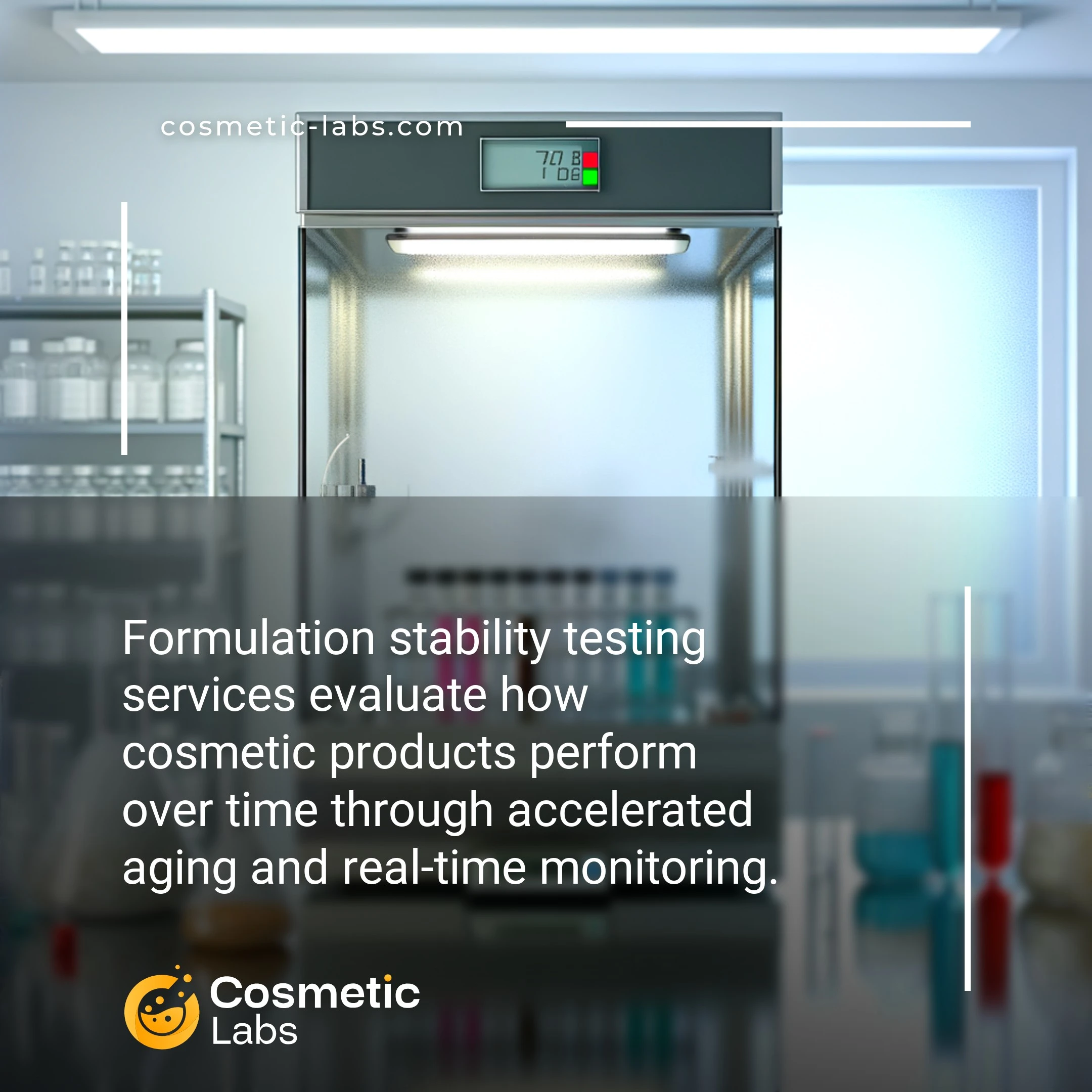Stability Testing Services for Cosmetic Formulations

What is Formulation stability testing?
Formulation stability testing services analyze how your cosmetic products perform under various environmental conditions over time, including temperature fluctuations, humidity exposure, and UV light. Labs conduct accelerated aging studies that compress months of real-world storage into weeks of controlled testing, revealing potential issues like color changes, separation, or texture degradation before you launch to market.
Why do you need this service?
Cosmetic labs use accelerated aging protocols to predict how your skincare formulas will perform after 12-24 months on retail shelves within just 3-6 weeks of testing. Brand owners submit new serums, creams, and treatments to evaluate color changes, separation, pH shifts, and microbial growth under controlled temperature and humidity conditions, ensuring regulatory compliance and consumer safety before market launch.
Who provides Formulation stability testing services?
All cosmetic labs providing Formulation stability testing services
There is no company providing these services at the moment.
Formulation Stability Testing Services
Formulation stability testing validates how your cosmetic products perform under real-world conditions over time. Professional labs run accelerated aging tests, temperature cycling, and microbial challenge studies to identify potential issues before you launch.
Accelerated Aging and Environmental Testing
Labs expose your formulations to controlled temperature and humidity conditions that simulate months of shelf life in just weeks. This process reveals color changes, separation, texture shifts, and ingredient degradation patterns. Temperature cycling between hot and cold conditions tests your product’s resilience to shipping and storage variations.
Testing protocols include:
- 40°C/75% humidity for 3-6 months
- Freeze-thaw cycles to check emulsion stability
- UV light exposure for photostability assessment
- pH monitoring throughout the testing period
Microbial Challenge and Preservative Efficacy
Microbial testing determines if your preservative system can handle bacterial, yeast, and mold contamination. Labs inoculate samples with specific microorganisms and track their growth over 28 days. This data helps you adjust preservative levels and validate your product safety claims.
Standard challenge organisms include:
- Staphylococcus aureus (bacteria)
- Pseudomonas aeruginosa (bacteria)
- Candida albicans (yeast)
- Aspergillus niger (mold)
Connect with experienced cosmetic labs on our platform to discuss your stability testing requirements and timeline needs.
Practical Applications of Formulation Stability Testing Services
Product safety and market longevity depend on rigorous formulation stability testing applications that validate performance across temperature variations, pH changes, and storage conditions.
Pre-Launch Product Validation
Labs conduct accelerated aging tests at 40°C and 75% humidity to simulate 24-month shelf life within 12 weeks. These protocols identify phase separation, color changes, and microbial growth before market release. Accelerated testing reduces development timelines by 18 months while preventing costly recalls.
Freeze-thaw cycling tests reveal emulsion stability issues that occur during shipping and storage. Labs perform 5-10 cycles between -10°C and 25°C to assess product integrity under temperature stress.
| Test Type | Duration | Conditions | Key Indicators |
|---|---|---|---|
| Real-time stability | 12-36 months | 25°C, 60% RH | pH, viscosity, appearance |
| Accelerated aging | 3-6 months | 40°C, 75% RH | Chemical degradation, separation |
| Freeze-thaw | 2-4 weeks | -10°C to 25°C cycles | Emulsion stability, texture |
Regulatory Compliance Documentation
FDA and EU regulations require stability data for cosmetic registration and safety assessments. Labs generate detailed reports documenting microbial limits, preservative efficacy, and chemical stability over specified timeframes. These reports support CPSR documentation and international market entry requirements.
Challenge testing validates preservative systems against bacteria, yeast, and mold contamination. Labs inoculate products with specific microorganisms and monitor log reduction rates over 28 days to ensure antimicrobial effectiveness meets regulatory standards.
Ready to validate your formulation’s stability profile? Contact experienced labs on our platform to discuss testing protocols tailored to your product requirements and target markets.
